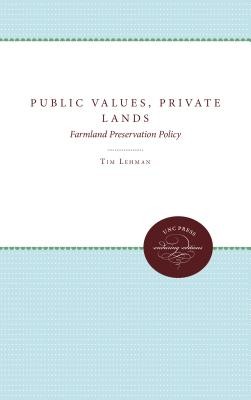
- We will send in 10–14 business days.
- Author: Tim Lehman
- Publisher: University of North Carolina Press
- ISBN-10: 0807844918
- ISBN-13: 9780807844915
- Format: 15.5 x 23.4 x 1.8 cm, softcover
- Language: English
- SAVE -10% with code: EXTRA
Reviews
Description
Tim Lehman examines the political battles over public policies to protect farmland from urban sprawl. His detailed account clarifies three larger themes: the ongoing struggle over land use planning in this country, the emerging environmental critique of modern agriculture, and the use of social science expertise in policymaking. Federal efforts to preserve private farmlands began during the New Deal with modest soil conservation and land use initiatives, but stalled with the agricultural surpluses of the postwar decades. Land conservation interests reemerged during the 1970s as productivity plateaus, population growth, and the energy crisis heightened concern about the loss of high-quality farmland. Bureaucrats and social scientists were divided on the seriousness of the land problem. According to Lehman, the debate pitted a conservation mentality against a production mentality, virtually guaranteeing that consensus would be impossible. Land preservation initiatives of the 1970s achieved a belated and partial success with the conservation measures of the 1985 farm bill, Lehman says, but the ecological constraints on agriculture remain significant.
Originally published in 1995.
A UNC Press Enduring Edition -- UNC Press Enduring Editions use the latest in digital technology to make available again books from our distinguished backlist that were previously out of print. These editions are published unaltered from the original, and are presented in affordable paperback formats, bringing readers both historical and cultural value.
EXTRA 10 % discount with code: EXTRA
The promotion ends in 15d.15:41:38
The discount code is valid when purchasing from 10 €. Discounts do not stack.
- Author: Tim Lehman
- Publisher: University of North Carolina Press
- ISBN-10: 0807844918
- ISBN-13: 9780807844915
- Format: 15.5 x 23.4 x 1.8 cm, softcover
- Language: English English
Tim Lehman examines the political battles over public policies to protect farmland from urban sprawl. His detailed account clarifies three larger themes: the ongoing struggle over land use planning in this country, the emerging environmental critique of modern agriculture, and the use of social science expertise in policymaking. Federal efforts to preserve private farmlands began during the New Deal with modest soil conservation and land use initiatives, but stalled with the agricultural surpluses of the postwar decades. Land conservation interests reemerged during the 1970s as productivity plateaus, population growth, and the energy crisis heightened concern about the loss of high-quality farmland. Bureaucrats and social scientists were divided on the seriousness of the land problem. According to Lehman, the debate pitted a conservation mentality against a production mentality, virtually guaranteeing that consensus would be impossible. Land preservation initiatives of the 1970s achieved a belated and partial success with the conservation measures of the 1985 farm bill, Lehman says, but the ecological constraints on agriculture remain significant.
Originally published in 1995.
A UNC Press Enduring Edition -- UNC Press Enduring Editions use the latest in digital technology to make available again books from our distinguished backlist that were previously out of print. These editions are published unaltered from the original, and are presented in affordable paperback formats, bringing readers both historical and cultural value.


Reviews